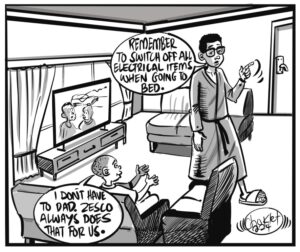THE Lusaka High court has declined to grant the conservatory order sought by Prime Television in matter where it has petitioned the court for an order quashing Information Minister Dora Siliya’s decision to cease all cooperation with the station.
Lusaka High Court Judge Catherine Phiri dismissed Prime Television’s application for a conservatory order in its entirety as Article 28 of the Constitution does not provide for interim orders.
She said the High Court is not at liberty to create its own rules and procedures nor is it entitled to enlarge its jurisdiction in terms of what remedies or reliefs it can grant to a party that comes before it.
In this matter, the television station which has cited the Attorney General, Topstar Communications Company Limited and Multichoice Zambia Limited as respondents, is seeking an order declaring unconstitutional the government’s decision to cease all transactions and business with it.
Prime Television further wants an order that all media houses have the right to access and disseminate information from government without undue hindrances, as well as compensation for loss of income and loss of business resulting from Topstar’s statement.
It also wants an order that Topstar Communications Company and Multichoice Zambia cannot remove it from their platforms at the direction of government.
But opposing to summons for the application for a conservatory order, the State argued that the High Court had no jurisdiction to grant conservatory orders against the State.
The State submitted that Prime TV was still at liberty to receive and disseminate information as it remained validly licensed (at the time) pursuant to the Independent Broadcasting Authority Act No.17 of 2002 and the TV station was still currently broadcasting through Multichoice platform.
It stated that Prime TV’s rights to receive and impart information had not been affected at all by the State merely ceasing collaboration with it.
The State added that the application for conservatory order should be dismissed for lack of merit as granting the order would injure public interest in a scenario where all media houses refused to air or publish the sensitisation messages in the fight against the coronavirus.
“In relation to the conservatory order being sought by Prime Television, we submit that this court has no power to grant such an order. An analysis on the order being sought by the petitioner has an effect of an injunctive relief which remedy is not tenable in this jurisdiction in light of section 18 (1) (2)of the States proceedings Act Chapter 71 of the laws of Zambia,” it argued
And Multichoice Zambia Limited, in its skeleton arguments, also opposed the conservatory order, arguing that the court was not clothed with the requisite jurisdiction to grant the conservatory order.
But in its reply, Prime TV argued that the court was clothed with the necessary authority to hear its application and grant the reliefs sought, adding that conservatory orders were different from injunctions, although the effect may be the same.
It prayed that the court may find that there were important questions on freedom of expression, including the right to disseminate and receive information without interference for Prime TV and the public, to be determined.
In her ruling, justice Phiri said it was not disputed that what Prime TV was asking the court to do was to grant them a conservatory order as their rights under Article 20 of the constitution had been infringed.
She said it was also not disputed that the specific type of order did not exist on the statute book but the sum effect of the order could be the same as grating the petitioner an injunction.
“As our Constitution is currently worded, there is no place for interim (interlocutory) orders when the enforcement of rights under Articles 11 to 26 is sought. The application before this court seeks to enforce rights under Article 20. Therefore, even by some stretch of jurisdiction under the state proceedings Act, Section 16, if I were persuaded to grant this conservatory order being sought (which I am not) it would not be tenable due to limitation placed by the interpretation of Article 28 by the Supreme Court,” justice Phiri said.
She therefore dismissed the application for conservatory order in its entirety as Article 28 of the Constitution did not provide for interim orders.
Judge Phiri, however, granted prime TV leave to appeal.
“Having found that this court lacks the requisite jurisdiction to grant the conservatory order applied for by the petitioner, it will be otiose for me to pursue the other questions that have arisen in pursuance of the application. In view of the foregoing, the application for conservatory order is dismissed in its entirety as Article 28 of the Constitution does not provide for interim orders,” ruled Judge Phiri.












